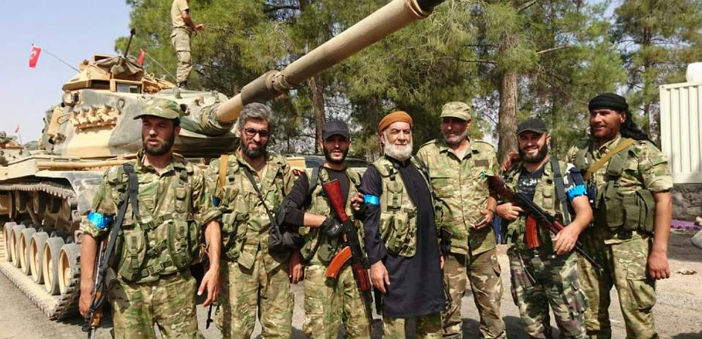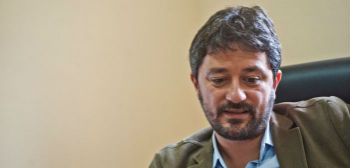Cerablus harekatı: Kime karşı ‘kalkan’ olmaya çalışıyorlar?


Türk Silahlı Kuvvetleri bu sabah saat 04.00’te Suriye'nin Halep kentine bağlı Cerablus kasabasına IŞİD’e karşı operasyon başlatıldı. “Fırat Kalkanı" ismi verilen harekatta, öncelikle fırtına obüsleri ve çok namlulu roketatarlarla gerçekleştirilen yoğun topçu atışının ardından savaş uçaklarıyla bölge bombalandı. AA, saat 11.25'te tank birliklerinin Suriye'ye girdiğini duyurdu. Saat 17.00’de ise AA, askeri kaynaklara dayandırarak verdiği haberde "Zırhlı birlikler eşliğinde öğle saatlerinde Türkiye sınırının güneyinde 3 kilometre içerdeki Keklice köyünü ele geçiren ÖSO güçleri, ilerlemesini devam ettirerek, buraya 5 kilometre mesafedeki Cerablus ilçe merkezinin girişine ulaştı" bilgisini verdi. Öte yandan bazı kaynaklar, TSK’nın ardından Özgür Suriye Ordusu’na (ÖSO) bağlı 1500 savaşçının da bölgeye girdiğini duyurdu. AA’nın haberine göre operasyon kapsamında 70'e yakın IŞİD hedefinin vuruldu. Suriye Dışişleri’nden "Tankların sınırı geçmesi egemenliğimizin ihlali" açıklaması yapıldı. ABD Başkan Yardımcısı Joe Biden’in Türkiye geldiği günle aynı ana denk getirilen operasyon için Türkiye Dışişleri Bakanı Mevlüt Çavuşoğlu, “Bir an evvel demokratik güçlerin içindeki YPG unsurları da Fırat'ın doğusuna geçmelidir. Aksi takdirde Türkiye gereğini yapacaktır” dedi. Suriye'deki Demokratik Birlik Partisi'nin (PYD) Eş Başkanı Salih Müslim ise operasyonu mesajında “Türkiye Suriye batağında. DAİŞ gibi yenilgiye uğrayacaklar” sözleriyle eleştirdi.
 Savaş değil, Mimbiç’e yanıt
Savaş değil, Mimbiç’e yanıt
Türkiye’nin Suriye’deki iç savaşa girip girmeyeceği uzun zamandır tartışılıyor ve çeşitli senaryolar dile getiriliyordu. Bugün de savaşa girdik yorumları yapıldı. Erbil eski konsolosu Aydın Selcen, Türkiye’nin Suriye topraklarına girmesini “savaş girmek” olarak yorumlamıyor: “Hava bombardımanı, Türkiye'nin de üyesi olduğu IŞİD karşıtı koalisyon şemsiyesinde yürütülüyor. Önceden belirlenen 12 hedefe 200'ü aşkın mühimmat kullanıldığı açıklandı. Karadan da keza topçu ateşiyle harekat destekleniyor. Özel Kuvvetler'den de sınırı geçip harekata katılanların olduğu anlaşılıyor. Tüm bunları alt alta koyduğumuzda Türkiye, Suriye'de savaşa girdi demeyi yerinde görmem. Yapılan daha ziyade, daha önce HPG'nin Sincar'da yerleşmesine cevaben Başika'da bir ileri üs kurulmasını anımsatır biçimde, bu defa YPG'nin Mimbiç'i IŞİD'den almasına bir yanıt oluşturduğunu düşünüyorum.”
‘Kürtlerin hakimiyeti tehlikesi doğunca’
İ.Ü. Siyasal Bilimler Fakültesi’nden Yardımcı Doç. Dr. Erhan Keleşoğlu ise Türkiye’nin zaten dolaylı olarak Suriye’deki savaşın içinde olduğunu, şimdi ise “müdahil olmak zorunda kaldığını” ifade ediyor. Keleşoğlu, “Türkiye, Kürtlerin öncülüğünde Suriye Demokratik Güçleri’nin Mimbiç’i almasından sonra Suriye’nin kuzeyinde bir Kürt hattı oluşmasının ciddi bir tehdit olarak algılıyor ve bu tehdidin önüne geçebilmek için, defaten, özellikle Suriyeli muhalifleri kullanmak istedi. Suriyeli muhalifleri IŞİD’in üzerine yönlendirerek, Azaz’dan Fırat Nehri’ne kadar olan hattı Suriyeli muhaliflerin tutmasından yana tavır aldı. Ancak Suriye muhalifler bunu beceremediler. Suriye Demokratik Güçleri’nin Fırat’ın batısına geçmesi ve hızla ilerlemesiyle birlikte bölgedeki IŞİD varlığının ortadan kalkarak, sınırın Suriye Demokratik Güçleri’nin ve dolayısıyla da Kürtlerin hakimiyetine girmesi tehlikesi, Türkiye’yi doğrudan müdahaleye itti” diyor. TSK’nın zırhlı birlikleriyle beraber piyade olarak Suriyeli muhaliflerin olduğuna dikkat çekiyor.

Neden Fırat Kalkanı?
Keleşoğlu, IŞİD’in temizlenmesi açıklamasının tam olarak gerçeği yansıtmadığını da sözlerine ekliyor. Keleşoğlu şöyle konuşuyor: “Harekatın ismi her şeyi açıklıyor: Fırat Kalkanı. Neye karşı kalkan olmaya çalışıyorlar? Kürtlerin ilerlemesinin önüne set çekmek için kalkan olmaya çalışıyorsunuz. Elbette IŞİD gitgide büyük bir güvenlik meselesi haline geldi Türkiye için. IŞİD’in sınırdan uzaklaştırılması elzem. Türkiye bunu Suriyeli muhalifler yapsın istedi ve beceremedi. Dolayısıyla Türkiye, ABD’nin öteden beri talep ettiği üzere IŞİD’e karşı aktif bir şekilde harekete geçerek, IŞİD’i sınırından uzaklaştırarak iki şeyi hedefliyor: Sınır güvenliğini sağlamak ve Suriye Demokratik Güçlerinin daha fazla ilerlemesini engellemek.” Türkiye’nin bu şekilde hareket ederek, hem ABD ve Rusya’nın Suriye planı masasında yerini sağlamlaştırmaya hem de hasım olarak gördüğü PYD ya da YPG’nin önünü almaya çalıştığının altını çiziyor.
ABD ile uzlaşma
Keleşoğlu, TSK’nın Cerablus’ta kalıcı olacağını düşünmüyor, sınır hattının IŞİD’den temizlenmesi ve bir tampon bölge oluşturulmasından sonra, bölgenin Türkiye tarafından kontrol edilen ÖSO unsurlarına teslim edilip dönüleceğini söylüyor. Ama öte yandan Türkiye’nin tam da Biden’in geldiği günde operasyonun başlatılmasının önemine değiniyor: “Türkiye ile ABD’nin Suriye’ye ilişkin politikalarında bir uzlaşmaya doğru ilerlediklerini düşünüyorum. Türkiye, ABD’nin en başından beri istediği şekilde hareket etmeye başladı. Ama ABD’nin Suriye Demokratik Güçlerine verdiği destek, hala bir anlaşmazlık konusu. Bu konuda nasıl bir uzlaşmaya varılacak önümüzdeki günlerde göreceğiz” diyor.
Kürt meselesine ulusal değil, bölgesel bakış
Öte yandan operasyonun HDP’nin ve KCK’nın müzakere çağrısı yaptığı döneme denk düşmesi de önemli. Keleşoğlu, “KCK açıklamasının olduğu gün, hükümet biz tekrar barış görüşmelerine başlamayı düşünmüyoruz dedi. Türkiye esas olarak Suriye’de Kürt tarafının pozisyonunun güçlenmesinin önünü almaya çalışıyor ve bu bölgesel bir mücadele. Yani Türkiye, Kürt meselesine bakarken, artık ulusal değil, bölgesel bakıyor ve Kürt hareketinin güçlenmesini sınırlamak asıl hedef haline geliyor. Türkiye’deki Kürt meselesi zaten olanca şiddetiyle sürüyor, ne kadar alevlendirebilir ki?” diye soruyor.
Kürtlerle iyi ilişkiler için
Aydın Selcen ise “Türkiye'nin Kürt sorununda çözüme erişmesi, iç huzura kavuşması Suriye'deki gelişmelerle iç içe geçmiş halde. Türkiye'nin Suriye'deki gelişmeleri de dün Numan Kurtulmuş'un da teslim ettiği üzere tek başına yönlendirmesi mümkün değil. Neticede Türkiye komşusu Kürtlerle de yurttaşı Kürtlerle de birlikte medeni bir hayatı kurmak zorundadır.”


